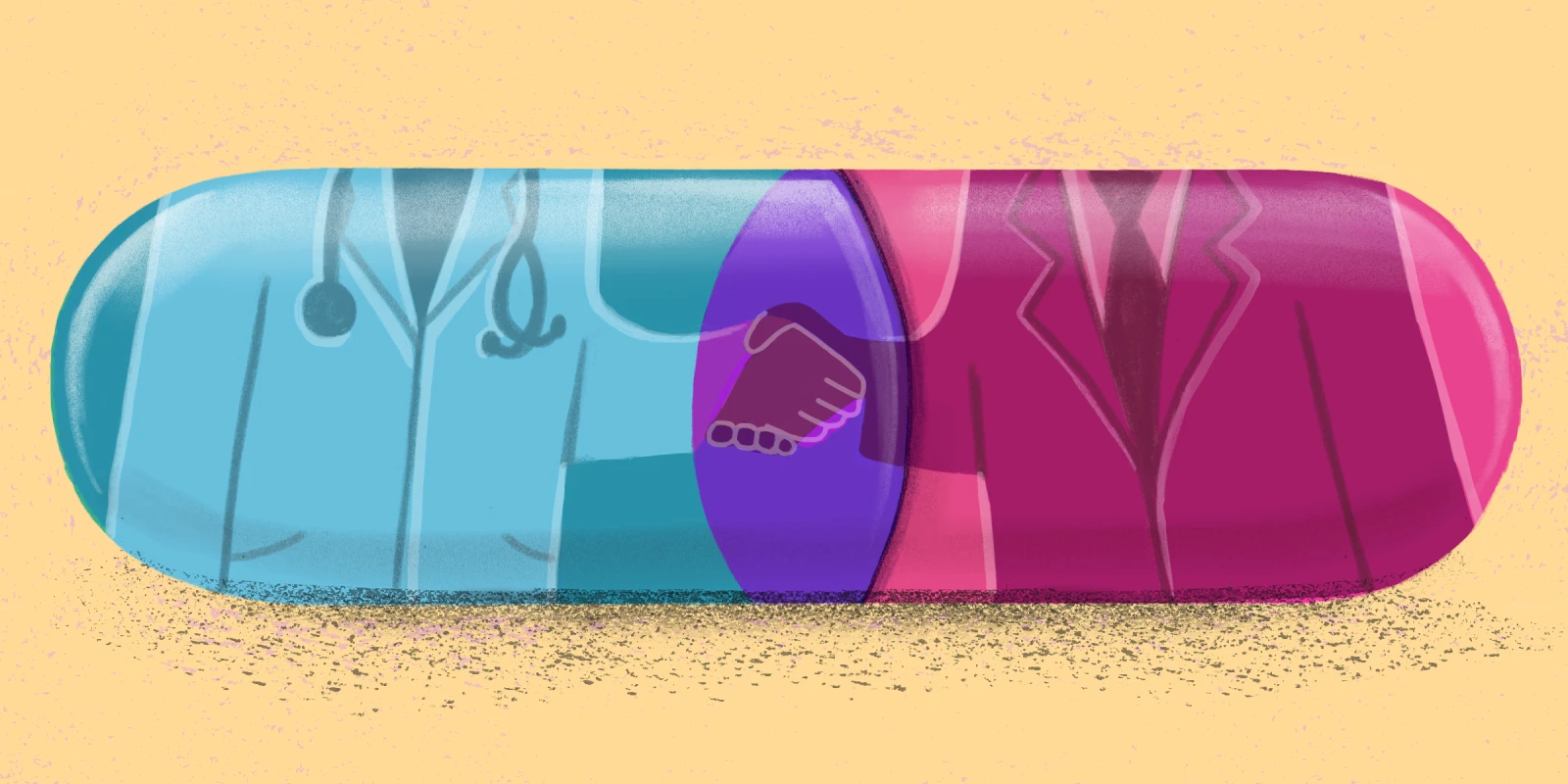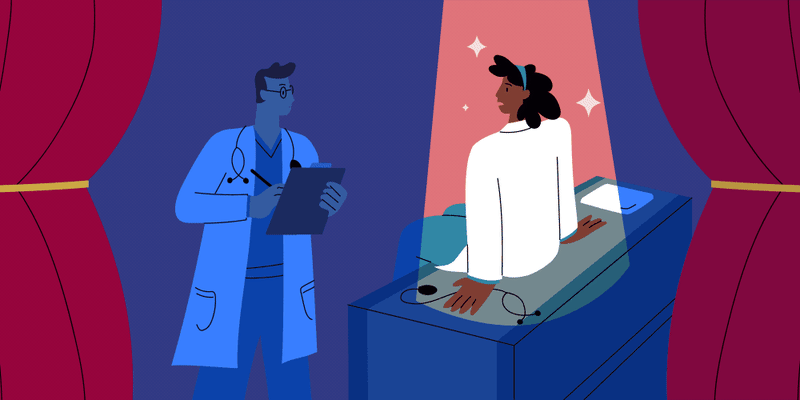My first encounter with the pharmaceutical industry occurred during my elective rotation as a final-year medical student in Houston. It was during a noon conference in July, and a new intern class was just getting started. Representatives were giving away the latest edition of the Washington Manual of Internal Medicine (along with lunch). Strapped with an appetite for food and knowledge, I stood in line with the others. When my turn came, I eagerly grabbed a warm, hearty meal and the book. That moment happened almost two decades ago.
Since completing my training, I have worked in an academic center with a strong research focus, a county hospital, and private practices — each offering a unique perspective on the pharmaceutical and devices industry’s role in health care. I have witnessed the broad range of perceptions of and interactions with the industry, from the purist approach — where the industry is viewed solely as a for-profit entity pushing its agenda and deemed unworthy of clinicians’ engagement — to the diametric opposite, where pharma representatives roamed the hallways of the clinic, such that the commute from my office to the exam room 20 feet away was riddled with detractions by them.
At the same time, I have seen my mentors and other faculty members conducting industry-sponsored clinical trials and my colleagues speaking on behalf of pharmaceutical and device companies. This led me to ponder: As clinicians, can we ever maintain an ethical and patient-centric relationship with the industry?
I believe the answer is yes.
Full disclosure, I do not speak for any drug or device company, nor do I serve as a consultant for them. However, I occasionally participate in post-marketing studies and serve as a co-principal investigator in clinical trials funded by the industry.
From that naïve luncheon in medical school to my years of practice in academia, safety-net institutions, and private practices, I have come to appreciate the nuances of this issue. I must confess, it is disheartening when institutions outright dismiss any collaboration with the industry, equating it with collusion and stigmatizing those who engage in such partnerships.
I have come to believe there is a way to establish a healthy and ethical relationship that benefits both patients and physicians.
In my experience, the industry itself makes a clear distinction between its scientific team (medical science liaisons, chief scientific officers, and trialists, among others) and its sales team (pharmaceutical representatives).
As physicians, we take pride in practicing evidence-based medicine. Whether or not to prescribe a certain drug or use a specific device should not be influenced by pharmaceutical sales and, for that matter, their scientific teams. As the saying goes in business, “A good product sells itself.” A clinically effective, well-researched, trial-proven drug does not require convincing by the industry. As my colleague Dr. Arthur Guerrero often says, “We are the worst football fans ever! We side with whoever wins the Super Bowl.” In this instance, the Super Bowl is the analogy for the robust science behind a drug or device.
Health care is complex and convoluted. The seemingly simple act of writing a prescription and getting it into the patient’s hands is barricaded with coverage issues, prior authorizations, patient training, specialty pharmacies’ involvement, and specific requirements of step therapy, among others. Oftentimes, practices need to invest significant resources to tackle these and thus contribute to the ballooning overheads. That’s where we leverage the industry’s resources.
One of the most important distinctions we make in our practice is to discuss scientific evidence with the science team and address the logistical barriers of getting drugs and devices to patients with the sales team. In our practice, the pharma reps know better than to try to discuss science with us. Any clinician learning science from the sales team should reprioritize and re-strategize their CME needs. Instead, our engagement with sales teams revolves around drug/device coverage, patient assistance programs, training on device usage, and anything else that streamlines the process of getting prescriptions into patients’ hands without clogging patient portal inboxes, phone lines, or increasing our overhead.
Physicians, like any humans, are fallible. Maintaining a strict mental discipline to separate science from sales is essential. And creating a milieu that reinforces that is always helpful. To reinforce this principle, our clinic has a designated area — we call it our practice’s ‘blood-brain barrier’ — beyond which sales representatives are not permitted. All interactions occur within the confines of this space and in a time-limited manner, ensuring a clear separation between commercial influence and clinical decision-making.
We respect our pharmaceutical representatives and acknowledge their role in helping us navigate the tortuous and often torturous process of obtaining patient access to medications and devices.
However, the ethics of roles that overlap science and sales — such as serving as a speaker for the industry — must be carefully examined.
The industry recognizes expertise and values meaningful contributions from experienced clinicians. If industry facilitates a physician’s ability to share their experience with peers, I see nothing unethical about it. However, a physician prescribing a drug simply to increase their visibility with the company and enhance chances of being invited into the speaker circuit is unquestionably unethical. Clinicians must be self-reflective (keeping their conscious and unconscious biases in check) and self-accountable. This is certainly easier said than done.
Being a thought leader requires both expertise and experience. Be it through patient education, providing meaningful feedback to the industry, and/or participating in clinical trials that are highly regulated by both the industry and government agencies, clinicians can make their voices heard. Especially Phase 4 or post-marketing studies, which serve as a bridge between science, the clinical efficacy of a drug or device in a controlled environment, and the pragmatism of using those in the real world to derive maximum benefit for patients. It allows us to understand previously unidentified effects, both desirable and undesirable. This is one area where collaboration between clinical practices and industry has been indispensable.
While any reasonable clinician wouldn’t advocate for an open-door policy that allows the pharmaceutical industry to directly influence patient care and clinical decision-making, a “partial open-door” policy — one that maintains a clear distinction between sales pitches and scientific discourse — can add real value to patient care.
Ultimately, ethical collaboration between clinicians and the pharmaceutical industry is possible. It requires discipline, clear boundaries, and a commitment to evidence-based medicine. When managed correctly, this relationship can improve patient care, streamline health care delivery, and advance scientific understanding. It will not solve all the gargantuan problems our health care system is riddled with, but in my experience, it does make practicing medicine a bit less frustrating.
What is your experience working with the pharmaceutical industry, and how do you see it impacting (or not impacting) your practice? Share below!
Dr. Ameer Khowaja is an endocrinologist based in San Antonio, TX. In addition to his clinical practice, he enjoys participating in population research, teaching internal medicine residents, community volunteer work, reading, writing, and spending time with his family. Dr. Khowaja is a 2024–2025 Doximity Op-Med Fellow.
Illustration by Diana Connolly







